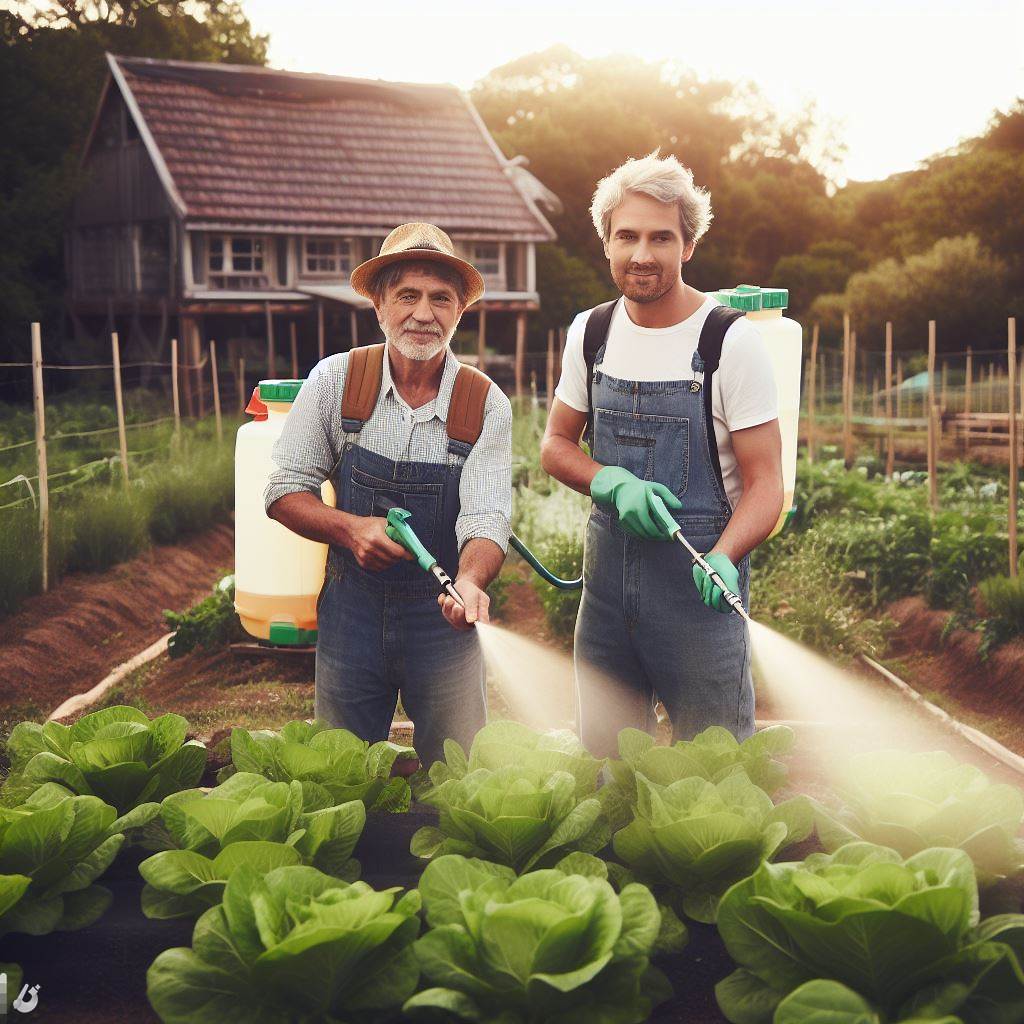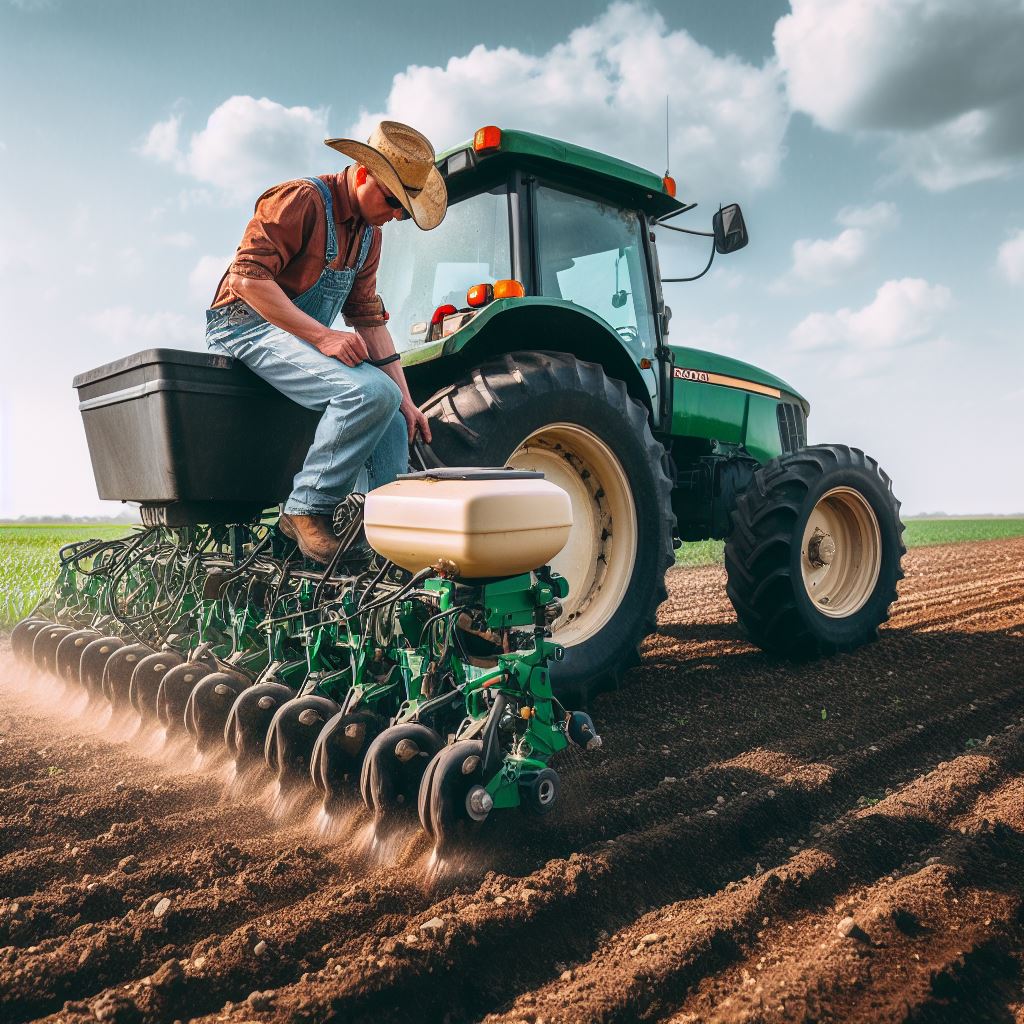Introduction
In the lush expanse of organic vegetable farms, where the soil breathes life and the air hums with the promise of sustainability, the delicate balance between abundance and adversaries unfolds.
Pests, often unwelcome guests in this verdant haven, pose a perennial challenge for farmers committed to organic practices.
This section embarks on a journey through the intricate landscapes of organic vegetable farming, exploring the nuanced art of managing pests while upholding the principles of ecological harmony and purity.
As stewards of the land, organic farmers tread a path guided by the principles of natural balance, eschewing synthetic pesticides in favor of sustainable alternatives.
In this exploration, we delve into the world of biological controls, companion planting, and innovative integrated pest management strategies that stand as the guardians of organic vegetable crops.
From the vibrant rows of leafy greens to the thriving vines of tomatoes, understanding the methods to shield these crops from pests becomes paramount for the organic farmer.
Join us as we navigate through the challenges and triumphs, unveiling the arsenal of nature-inspired pest management techniques that not only preserve the integrity of organic vegetables but also cultivate a resilient, thriving ecosystem.
Welcome to the realm where sustainability meets cultivation, and where the guardianship of green extends beyond the harvest, ensuring the legacy of organic farming endures in every leaf and root.
Understanding Pests in Organic Vegetable Farms
Organic vegetable farms face several challenges when it comes to managing pests.
It is essential to understand the common pests that infest these farms to effectively develop pest management strategies.
Common pests in organic vegetable farms
Insects are a major concern in organic vegetable production.
Aphids, caterpillars, and beetles are examples of insect pests that can damage crops.
These pests feed on the plant foliage, leading to stunted growth and reduced yields.
Diseases caused by various pathogens are also prevalent in organic vegetable farms.
Fungal diseases, bacterial infections, and viral infections can spread quickly and cause severe damage.
Transform Your Agribusiness
Unlock your farm's potential with expert advice tailored to your needs. Get actionable steps that drive real results.
Get StartedThese diseases often manifest as leaf spots, wilting, and rot, negatively affecting the overall health of the plants.
While weeds are not typically considered pests, their presence poses a threat to organic vegetable crops.
Weeds compete with the vegetables for sunlight, water, and nutrients, reducing the quality and yield of the crops.
Threats posed by pests to organic vegetable crops
Pests pose significant threats to organic vegetable crops.
They can lead to substantial economic losses and ecological imbalances.
Pests can destroy the entire crop or make it unsuitable for sale due to cosmetic damage.
Insects, such as aphids, are capable of spreading plant diseases, exacerbating the damage caused by pests.
Additionally, diseases like fungal infections can spread rapidly and affect neighboring plants, increasing the risk for an entire farm’s production.
Weeds present an indirect threat by reducing the availability of resources to organic vegetable plants.
They compete for sunlight, space, and essential nutrients like nitrogen, phosphorus, and potassium.
This competition negatively impacts the growth and overall health of the crops.
Importance of identifying and monitoring pests in a timely manner
Early detection and continuous monitoring of pests are critical in organic vegetable farming.
By identifying pests promptly, farmers can implement appropriate control measures to minimize damage.
- Visual inspection of crops helps identify early signs of pest infestation, allowing for timely intervention.
- Using traps strategically placed in the field can help capture and monitor insect pests, providing valuable data for decision-making.
- Monitoring weather conditions is crucial as certain pests thrive under specific environmental conditions. Farmers can take preventive measures accordingly.
- Tracking plant growth and development aids in identifying potential stressors that might attract pests. Timely adjustments can reduce pest pressure.
By staying proactive and vigilant, organic vegetable farmers can protect their crops and ensure high-quality yields.
Read: Pest Control in Corn Fields: Effective Strategies
Prevention and Cultural Practices
In order to effectively manage pests in organic vegetable farms, certain preventive measures and cultural practices should be implemented.
Crop rotation and diversification strategies
Crop rotation involves the practice of growing different crops in different seasons to break the life cycle of pests.
This reduces the build-up of pests and diseases in the soil.
Diversification, on the other hand, involves planting a variety of crops, flowers, and herbs to attract beneficial insects that help control pests naturally.
Proper site selection and soil health management
Site selection is crucial for organic vegetable farms.
It is important to choose a site that has good air circulation, adequate sunlight, and well-drained soil.
Soil health management, such as adding organic matter and maintaining proper pH levels, helps promote a healthy soil ecosystem, which in turn supports naturally pest-resistant plants.
Creating physical barriers and using protective covers
Installing physical barriers like fences, nets, and screens can help keep out larger pests like rabbits, birds, and deer.
Additionally, using protective covers such as row covers and tunnels can protect crops from insect pests while still allowing air and sunlight penetration.
Showcase Your Farming Business
Publish your professional farming services profile on our blog for a one-time fee of $200 and reach a dedicated audience of farmers and agribusiness owners.
Publish Your ProfileImplementing good sanitation practices
Maintaining proper sanitation practices is essential in preventing pest infestations.
This includes removing any crop residue and plant debris after harvest, as they can harbor pests and diseases.
Regularly cleaning and disinfecting tools and equipment also helps prevent the spread of pests.
Implementing these prevention and cultural practices is crucial to managing pests in organic vegetable farms.
By reducing the reliance on synthetic pesticides, farmers can maintain the integrity of organic farming and ensure the production of healthy and sustainable crops.
Read: Climate Impact on Potato Growth: What to Know
Biological Control Methods
Biological control
Using biological control methods in organic vegetable farming has many benefits.
It is an environmentally friendly approach that reduces dependence on chemical pesticides.
Let’s explore some key aspects of biological control methods.
Predatory insects and beneficial organisms
One of the main components of biological control is the use of predatory insects and beneficial organisms.
These natural enemies prey on pests, helping to control their populations.
Examples of predatory insects include ladybugs, lacewings, and parasitic wasps.
Attracting and maintaining beneficial insects and organisms
Attracting and maintaining beneficial insects and organisms is crucial for effective biological control.
Farmers can create habitats that provide shelter, water, and food sources for these beneficial organisms.
Planting flowering plants, using cover crops, and maintaining hedgerows can help attract and support beneficial insects.
It’s important to note that not all insects are harmful to crops. Some, like bees and butterflies, are essential pollinators.
Therefore, it’s necessary to use selective control methods that target only pests while preserving beneficial insects.
Using biological control agents as a complementary pest management strategy
Using biological control agents as a complementary pest management strategy can greatly enhance the effectiveness of organic farming practices.
These agents are commercially available and can be introduced into the ecosystem to control specific pests.
For example, parasitic wasps can be released to control aphids or caterpillar pests.
Implementing biological control methods requires careful planning and monitoring.
Farmers should assess their pest problems and choose appropriate biological control agents accordingly.
Regular monitoring of pest populations and beneficial organisms will help gauge the success of biological control strategies.
In general, biological control methods offer a sustainable and eco-friendly approach to managing pests in organic vegetable farms.
By harnessing the power of predatory insects and beneficial organisms, farmers can reduce reliance on chemical pesticides and promote a healthier ecosystem.
Attracting and maintaining beneficial insects, along with using biological control agents, further enhances the effectiveness of this pest management strategy.
With proper planning and monitoring, farmers can successfully implement biological control methods and enjoy the many benefits they offer.
Read: Organic Fertilizers: Boosting Soil Health
Organic-approved Pesticides
Overview of organic-approved pesticides
Organic-approved pesticides are substances allowed for use in organic farming to manage pests.
These pesticides are derived from natural sources such as plants, minerals, and microbes.
They are considered safer for the environment and human health compared to synthetic pesticides.
Active ingredients and modes of action
- Organic-approved pesticides contain active ingredients that target specific pests or pests’ life stages.
- The active ingredients disrupt the pests’ physiology, behavior, or reproductive system.
- Some organic-approved pesticides work by repelling pests or creating physical barriers.
- Rotenone, pyrethrum, and neem oil are commonly used organic-approved pesticides.
Understanding product labels and safety precautions
- Product labels provide important information about organic-approved pesticides.
- It is essential to read and understand the labels before using any pesticide.
- Labels indicate the active ingredients, target pests, application rates, and safety precautions.
- Safety precautions include wearing protective clothing, avoiding contact with skin and eyes, and proper disposal of unused pesticides.
Proper application techniques and timing
- Follow the instructions on the product labels for correct application of organic-approved pesticides.
- Apply pesticides when the pests are most vulnerable or during their active growth stages.
- To minimize the impact on beneficial insects, apply pesticides in the early morning or late evening.
- Use appropriate equipment like sprayers or dusters to ensure effective coverage of the crops.
- Regular monitoring of pest populations can help determine the optimal time for pesticide application.
Overall, organic-approved pesticides play a significant role in managing pests in organic vegetable farms.
They offer a natural and safer alternative to conventional pesticides while maintaining the organic integrity of the produce.
By understanding the active ingredients, modes of action, and proper application techniques, organic farmers can effectively control pests while minimizing environmental and health risks.
Remember to always read and follow the product labels and take necessary safety precautions to ensure responsible pesticide use.
Read: Irrigation Methods for Rice: Maximizing Yield

Integrated Pest Management (IPM) Techniques
IPM and its principles
Integrated Pest Management (IPM) is a holistic and sustainable approach to pest management on organic vegetable farms.
It aims to minimize the use of pesticides while effectively controlling pests.
IPM is based on several principles that guide farmers in implementing these techniques.
Monitoring and identification of pests and beneficial organisms
Regular monitoring of pests and beneficial organisms is crucial in IPM.
Showcase Your Farming Business
Publish your professional farming services profile on our blog for a one-time fee of $200 and reach a dedicated audience of farmers and agribusiness owners.
Publish Your ProfileThis allows farmers to accurately identify the pest species and assess their population levels.
Beneficial organisms, such as predatory insects and parasites, can play a significant role in controlling pests naturally.
Setting economic thresholds for intervention
Economic thresholds help farmers determine the point at which intervention becomes necessary.
It is the pest population level at which the potential damage outweighs the cost of control measures.
Setting economic thresholds ensures that farmers intervene only when it is economically justified, reducing unnecessary pesticide applications.
Sequential pest management techniques
IPM techniques involve a combination of preventive and curative measures.
Prevention includes cultural practices such as crop rotation and selection of pest-resistant varieties.
When pests exceed economic thresholds, curative measures like biological control, physical barriers, and selective pesticide applications can be employed.
Recordkeeping and evaluation of pest management strategies
Recordkeeping is an essential component of IPM.
Farmers must maintain detailed records of pest populations, control measures applied, and their effectiveness.
Evaluating pest management strategies allows farmers to learn from past experiences, identify areas for improvement, and make informed decisions in future seasons.
By implementing IPM techniques, organic vegetable farmers can effectively manage pests while minimizing the use of synthetic pesticides.
It is a proactive and sustainable approach that promotes ecosystem health and long-term farming viability.
Community Collaboration and Knowledge Sharing
Importance of Networking and Collaboration Among Farmers
- Active networking and collaboration among farmers play a crucial role in managing pests in organic vegetable farms.
- By connecting with other farmers, valuable information and experiences can be shared, leading to better pest management strategies.
- Networking allows farmers to learn from each other’s successes and failures, making the process of pest management more efficient.
- Collaborative efforts enable farmers to collectively address challenges and find sustainable solutions.
Participating in Organic Farming Associations and Forums
- Joining organic farming associations and forums provides a platform for farmers to connect with like-minded individuals.
- These associations and forums foster a sense of community and support among farmers practicing organic agriculture.
- Farmers can discuss pest management techniques, exchange ideas, and stay updated on the latest research and developments.
- Through these platforms, farmers can gain access to valuable resources, training programs, and expert guidance.
Sharing Knowledge and Experiences to Improve Pest Management Practices
- Sharing knowledge and experiences is key to continuously improving pest management practices in organic vegetable farming.
- By openly sharing successes and failures, farmers contribute to the collective learning process.
- Through shared experiences, farmers can develop innovative strategies that are effective in managing specific pests.
- Collaborative approaches also promote the use of integrated pest management (IPM) techniques, which prioritize prevention and non-chemical control methods.
- Knowledge sharing can help identify pest trends and outbreaks, enabling proactive measures to be taken at the community level.
- Farmers can share information on organic pesticides, natural predators, and resistant crop varieties for effective pest control.
- Collaborative efforts in generating research data improve the understanding of pest behaviors and contribute to viable solutions.
- Knowledge exchange showcases the value of organic farming, fostering awareness and support from consumers and policymakers alike.
In a nutshell, community collaboration and knowledge sharing are vital aspects of managing pests in organic vegetable farms.
By actively networking and collaborating, farmers can share valuable insights, improve pest management strategies, and collectively work towards sustainable solutions.
Participating in organic farming associations and forums facilitates a supportive community for knowledge exchange and resource access.
Sharing experiences and information enhances pest control practices, prioritizing prevention and non-chemical approaches.
Together, farmers can shape a more resilient and effective organic agriculture sector.
Learn More: The Future of Farming: AI & Climate Change
Discover More: Pesticide Use: Making the Right Choice
Find Out More: Effective IPM for Common Crop Pests
Conclusion
Throughout this blog post, we have explored various strategies for managing pests in organic vegetable farms.
We discussed the importance of implementing proactive approaches to pest management, including crop rotation, using resistant varieties, and practicing good cultural practices.
It is crucial for organic farmers to be proactive in their pest management approaches.
By implementing preventive measures and focusing on building healthy soil and plant resilience, farmers can minimize pest damage and reduce the need for chemical interventions.
In order to achieve successful pest management in organic vegetable farms, it is vital to encourage continuous learning and adaptation.
Farmers should stay updated on the latest research and techniques, and be willing to adapt their practices to changing pest pressures.
By integrating a combination of strategies such as biological control, cultural practices, and physical barriers, organic farmers can achieve effective pest management.
Implementing a holistic approach that takes into account the specific needs of each farm can lead to sustainable pest control and increased crop yields.
Managing pests in organic vegetable farms requires a proactive and adaptable approach.
By implementing key strategies and staying informed about the latest techniques, organic farmers can successfully manage pests and maintain the health and productivity of their crops.




